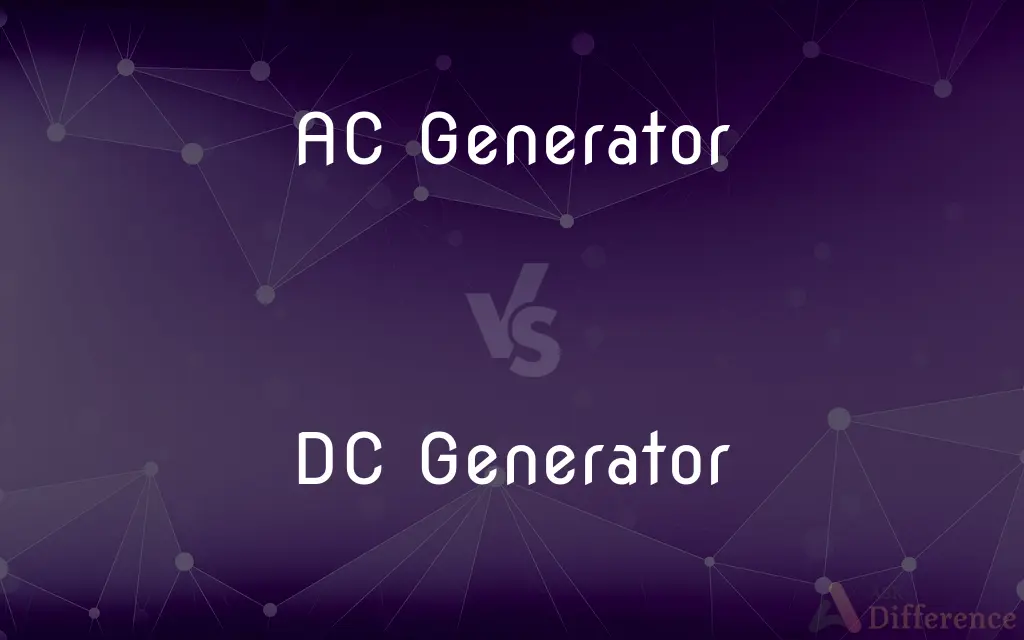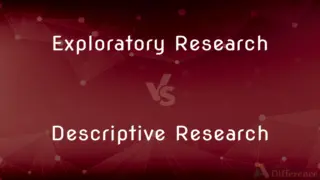AC Generator vs. DC Generator — What's the Difference?
By Tayyaba Rehman — Published on November 5, 2023
An AC Generator produces alternating current, periodically reversing in direction, while a DC Generator yields a unidirectional, constant direct current.

Difference Between AC Generator and DC Generator
Table of Contents
ADVERTISEMENT
Key Differences
Distinguishing between AC Generator and DC Generator, we explore varied aspects of electricity generation and its utilization in systems. The AC Generator, fundamentally, produces an alternating current, which means that the electric charge periodically reverses direction. Conversely, a DC Generator consistently delivers a charge in a single, unwavering direction, illustrating the primary operational divergence between the AC Generator and DC Generator.
AC Generators and DC Generators, while fundamentally existing to produce electrical energy, epitomize different mechanics and applications in electrical systems. AC Generators are widely adopted in power generation and distribution due to their capacity to easily transform voltage levels and their ability to transmit energy over long distances with minimal loss. DC Generators, on the other hand, are often employed in applications requiring a stable and continuous power supply, signifying a clear demarcation between the applications of AC Generators and DC Generators.
Exploring structural distinctions, the AC Generator typically utilizes slip rings, facilitating the generation of alternating current by providing a continuous electrical connection. The DC Generator, however, employs a commutator, which ensures that the current flows in a singular direction, establishing a structural and functional dichotomy between the AC Generator and DC Generator.
Regarding practical scenarios, AC Generators predominantly find utilization in power plants and the general electrical grid, given the adaptability and transmission advantages of alternating current. DC Generators tend to be more prevalent in applications like battery charging and supplying power to electromagnets, signifying application-specific utility variations between AC Generators and DC Generators.
Considering technological advancements and modern applications, AC Generators have found widespread use in renewable energy systems, like wind turbines, due to their inherent transmission benefits. Meanwhile, DC Generators have sustained relevance in specific applications requiring consistent voltage, like electroplating, thereby perpetuating differentiated roles for AC Generators and DC Generators within contemporary technologies and practices.
ADVERTISEMENT
Comparison Chart
Type of Current Produced
Alternating Current (AC)
Direct Current (DC)
Mechanical Construction
Utilizes slip rings
Employs a commutator
Typical Applications
Power plants, electrical grid
Battery charging, electromagnets
Transmission of Generated Power
Can transmit over long distances
Suited for close-range supply
Voltage Alteration
Easily transformed
Stable and constant
Compare with Definitions
AC Generator
Distance Power Transporter
AC Generators effectively transmit power over expansive distances, minimizing energy loss.
DC Generator
Stable Voltage Supplier
The unwavering current from a DC Generator ensures a steady voltage in electromagnets.
AC Generator
Variable Voltage Source
An AC Generator facilitates voltage transformation via transformers, enhancing transmission efficiency.
DC Generator
Localized Power Source
In applications like electroplating, DC Generators supply a dependable, local power source.
AC Generator
Slip Ring Utilizer
An AC Generator employs slip rings, maintaining a continual connection despite rotor motion.
DC Generator
Non-alternating Charge Provider
For applications necessitating a consistent electrical flow, a DC Generator is often employed.
AC Generator
Periodic Current Generator
The AC Generator in power plants creates a fluctuating current, ensuring grid functionality.
DC Generator
Commutator Implementer
DC Generators employ commutators, ensuring a single-direction current despite rotor oscillation.
AC Generator
Oscillating Charge Supplier
Wind turbines typically utilize AC Generators to deliver periodically reversing electrical charges to the grid.
DC Generator
Unidirectional Current Generator
A DC Generator provides a constant current, ideal for charging batteries efficiently.
Common Curiosities
Can AC Generators easily alter output voltage?
Yes, AC Generators can readily transform output voltage levels.
What is the purpose of a commutator in a DC Generator?
The commutator in a DC Generator ensures the current remains unidirectional.
Is the DC Generator suitable for long-distance transmission?
No, DC Generators are not typically used for long-distance power transmission.
Are AC Generators prevalent in the general electrical grid?
Yes, AC Generators are widely used due to the transmission benefits of AC.
What is a typical application for an AC Generator?
Power plants commonly utilize AC Generators for electrical power generation.
Can the AC Generator transmit energy with minimal loss over distances?
Yes, AC Generators can transmit energy effectively over long distances.
What current type does an AC Generator produce?
An AC Generator produces Alternating Current.
What component is pivotal for current alternation in an AC Generator?
Slip rings in an AC Generator facilitate the generation of alternating current.
Are DC Generators commonly found in large-scale power plants?
DC Generators are less common in large-scale power plants than AC Generators.
What ensures the DC Generator's current remains constant and unidirectional?
The commutator ensures that the DC Generator's current stays constant and unidirectional.
Do DC Generators provide a fluctuating current?
No, DC Generators provide a stable, non-fluctuating current.
How is the AC Generator advantageous for grid applications?
The AC Generator can easily alter voltage and minimize transmission loss across the grid.
Why might a DC Generator be chosen for battery charging?
DC Generators provide a consistent current, ideal for charging batteries.
Do AC Generators find applications in renewable energy systems?
Yes, AC Generators are often used in renewables, such as wind turbines, due to transmission benefits.
Is the output from a DC Generator easily transformed to different voltages?
No, DC Generators typically supply a consistent, stable voltage.
Share Your Discovery

Previous Comparison
Exploratory Research vs. Descriptive Research
Next Comparison
In Process vs. In ProgressAuthor Spotlight
Written by
Tayyaba RehmanTayyaba Rehman is a distinguished writer, currently serving as a primary contributor to askdifference.com. As a researcher in semantics and etymology, Tayyaba's passion for the complexity of languages and their distinctions has found a perfect home on the platform. Tayyaba delves into the intricacies of language, distinguishing between commonly confused words and phrases, thereby providing clarity for readers worldwide.













































